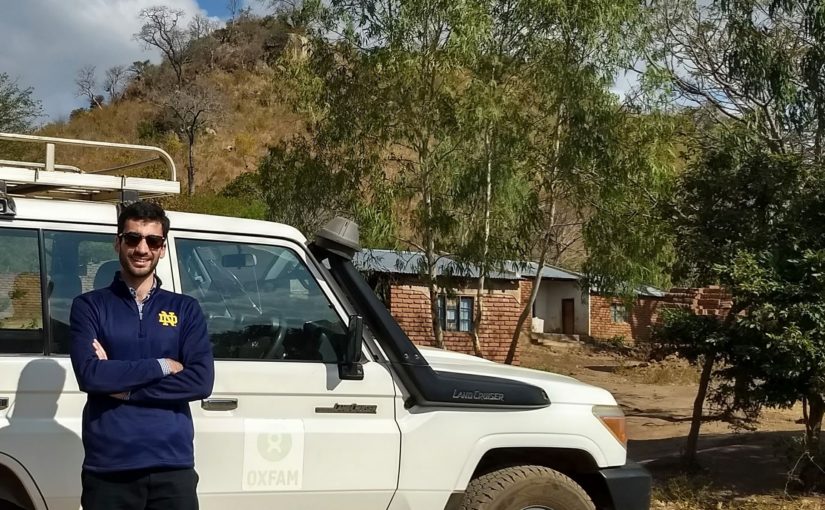by: Mian Moaz Uddin
“What is this boy from Peshawar doing in Africa?,” I kept thinking to myself as I looked down from my 30,000-foot window over the Sahara Desert. By the time we stopped at Addis Ababa for the layover, I was having a mini existential crisis.
The past four months of my master’s program, I’ve been in the i-Lab learning about the Behind the Brands campaign with Oxfam. My colleagues Sofia Del Valle, Caroline Andridge, and I had taken a deep dive into a program that covers ten of the world’s leading food and beverage companies on a comprehensive list of their social and environmental policies worldwide. The orientation week at Oxfam’s Boston office then brought our team together for one week to synthesize our work before we each parted for different research locations across the globe: Ghana, India, and Malawi, respectively. Now it was becoming real; I had six short weeks to gather as much information as possible to understand land rights and governance issues in Malawi to help the campaign.
Coming from a developing country myself, I’ve seen first hand the myopic development programs that are often administered by well-intentioned but oblivious foreigners. The Keough School of Global Affairs has further sensitized me to the perils of ‘quick fixes’ and ‘symptom targeting’ in the context of international development. Considering Malawi’s GDP is one of the lowest in the world and is heavily reliant on foreign aid, I wanted to ensure that I did not become one of those foreigners here.
A SPIRIT OF COMMUNITY IN MALAWI

I’m glad to say that my first week in Lilongwe allayed all of these concerns. Instead of seeing a frail state swarming with foreigners trying to fill the vacuum, I saw that most of the development work on the ground was being carried out by Malawians themselves. I happen to be the only foreigner in the Oxfam office here (maybe the whole block!). Furthermore, the members of civil society and government officials I’ve met with recognize the aid dependency problem.
At one of the workshops on women and land rights issues, the participants unanimously agreed that Malawi must develop independently from the ‘mzungus’ (foreigners) aid programs. The sentiment of self-reliance reverberates in government policies and the national character, as well. I’ve seen many public sponsored billboards here promoting local produce and industry and have found the supermarket shelves stocked with local brands. I usually judge countries by the way they drive. The spirit of community can be seen very well on the roads of Malawi where each driver displays the utmost patience, even in rush hour traffic, and pedestrian crossings are taken seriously, even on the most remote roads.
Needless to say, I was delighted to see the inclusive and horizontal approach to development, which we’ve learned as part of the Sustainable Development concentration at the Keough School of Global Affairs, being applied where it’s needed most.
STORIES OF DISPLACEMENT
Land has been a contentious issue in Malawi. As a British Protectorate, the British land laws were superimposed on the existing customary laws of the land. This created a dichotomy of land law, and land use loopholes, which have often been exploited by investors, corporations and corrupt officials to grab vast swathes of land—often displacing the indigenous populations and disturbing livelihoods. I’m traveling to these plantations and meeting with the affected communities, government representatives and civil society representatives; I will gather information to assess the state of land policy commitments made by the world’s leading food and beverage companies here.

Last week, I traveled to the Mulanje district to the south of Malawi to meet with a community displaced by a tea estate. The village was a quiet place surrounded by iridescent green tea plants with a stunning view of Mt Mulanje. The people, with their broad smiles and hospitality, reminded me that I was in the warm heart of Africa. While the lush landscapes, jolly people and slow pace of life seemed very charming to me, my focus group discussion with the community revealed that this tranquility belies the heart-breaking stories of displacement and the historic injustices committed against these people. The villagers revealed how they had been driven out of their own land and were now faced with food insecurity because of the lack of cultivable land in the face of a growing population.
Civil society organizations, like Oxfam, have been partnering with the government and corporations to introduce laws that formalize land rights for ‘customary land holders’ like the villagers I met. Almost two decades of effort has culminated in the recent passage of the Customary Land Act, which provides villagers like the Mulanje a mechanism to register and exercise authority over their land. The representative from the Ministry of Land explained to me that this has been a huge milestone for Malawi that will effectively close the loophole allowing corporations to exploit these communities. The civil society organizations here widely celebrated the passage of the law, but also acknowledge the fact that the law will only yield results if the communities and corporations are aware of its provisions; hence, organizations like Oxfam are shifting gears from activism to awareness, monitoring and evaluation.
This has been a truly humbling experience for me, and the people of Malawi have reaffirmed my belief in organic and inclusive growth. I’m very grateful to be here and participate in the Oxfam campaign. I look forward to reconvening in Washington, D.C., where we will discuss our collective experiences and findings from Malawi, India, and Ghana.


One thought on “Into the Warm Heart of Africa”
Comments are closed.